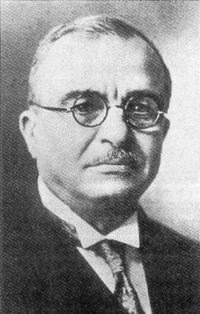Also known as:
Ιωάννης Μεταξάς
More People of Greece
More Topic Categories
Related Destinations
Ioannis Metaxas (12/04/1871 - 29/01/1941)
 Ioannis Metaxas was a Greek army officer, prime minister and dictator of Greece.
Ioannis Metaxas was a Greek army officer, prime minister and dictator of Greece.He was born in Ithaca in 1871 and had a happy childhood despite the financial problems of his family. In 1879, after his father lost his position as a prefect, the family was forced to move to Kefalonia, where Ioannis completed high school. In 1885, he enrolled in the Evelpides Military School and completed it in 1890. In 1894, he went to the local guard of Nafplio, where his family had already relocated. In 1897, he met the successor to the throne Constantine and became friends with him. His participation in the Greco – Turkish War that year taught him a lot and helped him gain the trust of the king. The following year, he went to Germany to complete his studies on a scholarship granted by the king. Returning to Greece in 1903, he helped in the organization of the army and he also taught military history and tactics to George II, who would later become king.
After the coup of 1909, the rebels transferred Metaxas to Larissa, because he was known for his friendship with the royal family. In 1910, the king appointed Eleftherios Venizelos as the prime minister, and Metaxas, who meanwhile had returned to Athens, became his military advisor, thus linking the government and the royalty. He participated in the Balkan Wars and was awarded the Golden Cross of the Saviour by the king. During the National Schism of 1915, Metaxas supported the king’s perspective to maintain neutrality, while Venizelos decided that Greece should participate in World War I on the side of the Allies.
In the elections of 1936, the supporters and opponents of Venizelos failed to create a government and King George II swiftly appointed Metaxas as Minister of the Military, under the government of Demertzis. Demertzis died suddenly one month later, and on the same day, without prior notice of the politicians, the king appointed Metaxas as Prime Minister. Three days later, all members of the parliament voted to stop any operations for five months, allowing the government to vote all laws of the country. This action and unprecedented political support that politicians offered to the authoritative government was met with public outrage and there were many protests; Metaxas decided to seize the opportunity, claiming that he was afraid of a communist revolt and placing his own people in important positions. Finally, he declared that he suspended most articles of the Constitution and instituted dictatorship, claiming fears for internal unrest and the unstable international situation.
Metaxas tried to maintain a balance between Britain and Germany; Britain was content with this neutrality, mainly because they could not provide any military support to the country. When the Italians started challenging Greece, Metaxas initially remained unopposed, while secretly preparing for military action on the side of the Allies. On 28 October 1940, the Italian ambassador visited Metaxas and gave him an ultimatum, requesting that Italian forces be allowed to enter the Greek borders. Metaxas rejected the ultimatum, siding with Britain, and surprised the Italians who believed the battle with Greece would be easy. This rejection was what increased his reputation among Greeks, even if it was not permanent. However, in 1941, he died unexpectedly of pharynx inflammation and was succeeded by Koryzis.
See Also:
 Athens Photos
Athens Photos
 Santorini Photos
Santorini Photos
 Crete Photos
Crete Photos
 Meteora Photos
Meteora Photos
 Corfu Photos
Corfu Photos






